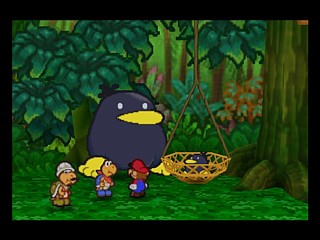
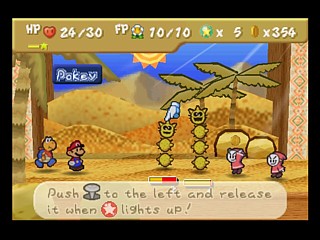
Paper Mario (2001 - N64) 
I feel really guilty about this. I own an actual N64 Paper Mario cartridge, but because it was more convenient at the time, I played it emulated on Project64. The reason I feel guilty is because most people I know who played it on their N64s had a lousy experience due to the graphics being rendered so blurry, they were unpleasant to look at and/or headache-inducing. But for whatever reasons, the graphics look much clearer on an emulator and, dare I say it, are actually quite gorgeous. The animation could've been a little better (I hated the way Mario doesn't move his arms when walking/running), but the backgrounds are very detailed and scenes are bursting with vibrant colors. If you don't want to emulate the game (caveat: there are some glitches, but nothing that make it unplayable), then another option is to buy it for Wii Virtual Console, which I've heard looks about as clear as the emulation does.
When my partner Crawl played this years ago, the music annoyed the hell outta me, but this time around, I came to appreciate the non-annoying parts more. I tried making sure not to hang out too long in the Boo's Mansion after Bow's theme takes over (the worst song in the game IMO), and I had to turn the volume down on Flower Fields until I cleared the boss. Oh, and then there was that whole Shyguy chapter that seemed to be intentionally trolling with the bad music. But most of the rest ranged from slightly dorky, to unintrusive, to good, to even great ("Sad Sun", which sadly, is only in one brief part).
The game, despite incorporating action elements the same way Super Mario RPG, and having some fairly long dungeons with a lot of puzzle-solving near the end, is generally easy (though I did have a few "Game Overs"), and I beat the final boss on my first try. It strikes me as being that era's version of a "Casual Game" - there's always a lot to do if you care about all the sidequests and completely exploring the game world, but none of it is too difficult (admittedly, I used a FAQ to get all the recipes - no way I had the patience for the trial-and-error involved in that).
So, I guess I did enjoy the game a lot more than I expected I would, and I won't try to change anyone's mind about it, but if you ever had an inkling to replay it anyway, choose a medium that will give you better visual output.
Rating: 3.5/5
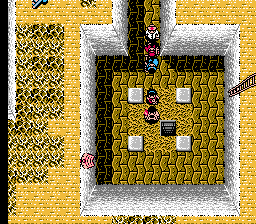
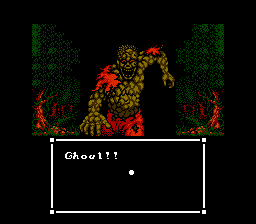
Sweet Home (1989 - NES) 
Much has already been reported about how Capcom's Sweet Home was one of the first Survival Horror games and the inspiration for the Resident Evil series, so I'm not going into details on that. Any number of other reviews will tell you. Instead, I'll focus on what stood out to me the most: Along with inventing the Survival Horror genre, it also may have invented the idea of a "Quick Play RPG". Oldschool, particularly NES/Famicom RPGs with a clear influence from Dragon Quest (overhead walking view/first-person battle view), usually bring to mind hours of level-building and exploring vast environments. Sweet Home's level-up pace is actually very quick, and the characters all gain the same stats per level, so they're equal in battle. Their main differentiating characteristics are specialized skills each has for solving puzzles or healing the party: One has a key for unlocking doors, one has a lighter to set things on fire, one has a first-aid kit, etc. Since the game takes place in a haunted mansion instead of an open world, navigation is quick and efficient, even despite frequently switching between the different party members (you have five total, but no more than three can be in a single party at once).
So, the main focus is on solving the myriad puzzles and keeping your characters alive (death is permanent, so if one dies, you either have to start from an earlier save, or find an item to replace their unique skill). The game is very puzzle-dense, meaning each new area of the mansion contains a series of goals that require finding the right items or using the right skills. Since your inventory is very limited, you can't just grab every item you find and hold onto it until you need it. You have to be selective about what you take and make sure to leave items you'll need later someplace where you can easily find them again. There are times, especially towards the end, when your inventory will be so filled with needed items that you won't be able to have more than one or two healing tonics with you, which could lead to playing quite a bit of the game with characters at low HP - a fact that adds some excitement to the battles. While most of the puzzles are not too difficult to solve (I had one incident of being stuck in the basement looking for a "Tool", because it wasn't clear what I had to do), the game's structure does keep you busy and involved.
The story is so bizarre that it's abundantly clear why a US release was canceled. Due to the strict censorship of the era, it would've been impossible to change everything "objectionable" and still have the game make any kind of sense. However, if you're like me and not really easily scared by video games, even those of the Horror genre, then you might not want to get your hopes up that this one will. The most disturbing elements of the story actually happened in the past, and it's more that your team is gradually uncovering pieces of the mystery.
The final boss is the only boss in the game and I beat it on my first try (with some difficulty due to a weird timing issue in using required items), but it does seem like it directly inspired the Giygas fight in EarthBound.
Rating: 4/5




The Best of Edgar Allan Poe 
Author: Edgar Allan Poe; Reader: Todd McLaren
(Audiobook - 2010; Original Stories - 1835-1846)
Figured since I played that Midnight Mysteries game a few months prior, I better read some Edgar Allan Poe. This collection contains: The Fall of the House of Usher; The Pit and the Pendulum; The Tell-Tale Heart; The Cask of Amontillado; The Premature Burial; Ligeia; The Black Cat; The Oval Portrait; Berenice; The Facts in the Case of M. Valdemar; and The System of Dr. Tarr and Prof. Fether. Many of these are, indeed, some of this best stories, although it's somewhat disappointing that it doesn't have "The Raven". That might be because it steered away from his poetry completely and kept only to the short stories, despite being called "The Best of Edgar Allan Poe", not "The Best of Edgar Allan Poe's Short Stories".
Even so, it's a decent collection, full of classics, and the audiobook reading is okay (a little over-the-top at times, but I didn't pay it much mind after awhile). Poe has a real knack for ending the story right on the most shocking moment, which often causes it to linger in my head for awhile, if not years later. "The Facts in the Case of M. Valdemar" is a great example of that, and so is "Berenice". The former I'd read years ago and never forgot it; the latter I'd never read until now.
Sometimes, Poe's musings can have even deeper psychological impact. Perhaps because I'm a cat owner, I found "The Black Cat" disturbing on more than one level. The notion of the main character seeming like a generally normal person who loved his cat, only to turn around and do the horrible things he does (supposedly from drinking too much, but still seeming like for no reason), really drilled into my psyche.
Poe's writings are always easily recommendable in print, so the main question here is whether the audiobook is worth checking out. It's definitely a good choice to borrow to get in a few short stories here and there while you work.
Rating: 4.5/5
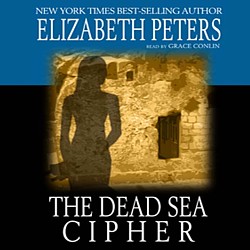
The Dead Sea Cipher
Author: Elizabeth Peters; Reader: Grace Conlin
(Audiobook - 1996; Original Book - 1970)
While I enjoy a good cipher mystery once in awhile, this book came across to me as being really silly. While vacationing in Jerusalem, Dinah hears an argument in the hotel room next door and finds out the next day that a man had been murdered. Unfortunately, since they were arguing in a foreign language, she can't tell the authorities much about what she heard. Two mysterious agents, one who might be good and one who might be bad, start shadowing her everywhere she goes because they think she knows more than she's saying. And this is where it gets ridiculous - the same thing keeps happening over and over again. Dinah goes somewhere, and somehow these two men have gotten there ahead of her. They jump out from an alley or show up at her hotel room to question her. And somehow, the more they do this, the more that gets revealed about the murder mystery and its connection to some lost Dead Sea scrolls that have recently been discovered. Certainly, a better way to unravel this mystery could've been concocted than something so contrived and repetitive?
Maybe I've just been too wrapped up in some of the world's most infamously unsolved cipher mysteries, such as Taman Shud and The Voynich Manuscript, which have confounded experts for years and still have no clear solution, but I felt the cipher was decoded way too quickly and easily. Dinah shows it to someone and he unravels the whole thing right away. Yeah, I know it probably is a good idea to solve it eventually, but c'mon.
Rating: 2.5/5
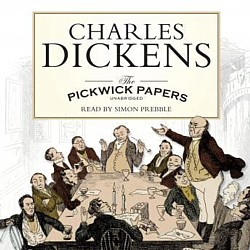
The Pickwick Papers
Author: Charles Dickens; Reader: Simon Prebble
(Audiobook - 2010; Original Book - 1836)
Charles Dickens's first novel involves a group of wealthy, retired gentlemen who go on a trip through the English countryside to report their findings back to their club. Despite being rich, they seem to be ne'er-do-wells in other aspects of life - one claims to be a great poet, but never writes any poetry; One brags about his sportsmanship, which I guess in those days meant "ability to use a gun", but when called to demonstrate, things always go comedically wrong.
Although the story is set in reality, where nothing supernatural can occur, Dickens "cheats" a bit by having the characters occasionally read or be told a story in which paranormal phenomena occur. One of the most memorable is a story about a weirdly twisted chair that somehow morphs into an old man. Another is like an early prototype of his much more famous work, A Christmas Carol.
I enjoyed most of this book, as it had a lot of interesting characters, memorable set pieces, and humorous situations, but about halfway through it starts having difficulties staying on the rails. Charles Dickens was originally asked to publish this as a monthly serial, but it seemed like the longer he wrote it, the less interested in the characters he became. Eventually, they meet Sam Weller, who becomes Mr. Pickwick's servant, and for some reason this character was so popular that the series became a sensation. Consequently, Sam Weller's role grew and grew, until eventually we're introduced to his father, who also becomes a main character. And I hated him and the parts of the story that involved him! I don't think there's much chance I would've liked him any more in print, but for the audiobook, the narrator's scratchy "old man" voice that he used for his dialogue was intolerable. It makes little sense how the scenes with the Wellers fit in with the "Pickwick Papers" when the whole idea was the club members writing about their adventures, and they're not around to witness them.
Eventually, after much neglect, the story finally returns to the Pickwickians for some more interesting scenes (particularly evocative is Mr. Pickwick's brief incarceration in Debtor's Prison), but another thing I didn't like is that there's this farm they stay at for a very long time - too long considering they're supposed to be out exploring. Then they all liked it so much, that after having left for awhile, they go back to it for the holidays. Argh!
So, I liked maybe about 2/3 of the book, but can only recommend it to Dickens fans and people who like stories set in early 1800's England.
Rating: 3.5/5
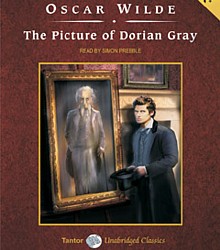
The Picture of Dorian Gray 
Author: Oscar Wilde; Reader: Simon Prebble
(Audiobook - 2008; Original Book - 1890)
As you may already be aware, The Picture of Dorian Gray is the classic story of a narcissisitc and hedonistic young man who has a portrait made of himself. After making a wish that his body could stay young forever while the picture ages in his place, he is surprised to find out that it comes true.
I had heard that this story was heavily censored back in the 1800s when it was published because it was deemed offensive and violated laws of public decency. I'm kind of wondering if the part where Dorian reads a book that goes on and on forever describing magical rings and their supposed magical powers is what replaced the censored material. Supposedly, reading this book is what sends Dorian down the dark path of immorality, but it seemed like nonsense to me. Maybe it doesn't matter much since he does some bad things even before he reads it, but like many cases I've seen of this in real life, his narcissism and irresponsible behavior is enabled by those around him. The book was even sent to him by the character who encourges it the most. I guess the moral is don't indulge too much in the unsavory behavior your associates want and listen to opposing viewpoints once in awhile, or you may end up being the only one who ultimately pays for it.
So, yeah, it's a great book with some weird and nonsensical parts, but a lot of thrilling, creepy, and emotionally tense parts as well. And the ending is as punctually shocking as something out of an Edgar Allan Poe story.
Rating: 4.5/5
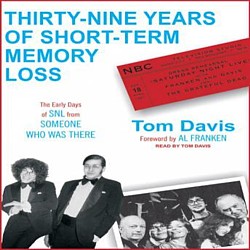
Thirty-Nine Years of Short-Term Memory Loss: The Early Days of SNL From Someone Who Was There
Author & Reader: Tom Davis
(Audiobook & Original Book - 2009)
The subtitle of this book is somewhat-misleading and some people speculate the publisher tacked it on there to sell more copies. It's an autobiography of actor/comedian/writer Tom Davis, who was Al Franken's writing and comedy partner for many years, and who did, indeed, write for Saturday Night Live. However, much of the book has nothing to do with SNL, and even when it does, it's mostly about how he hung around backstage smoking weed with The Grateful Dead, or dryly quoting sketches he wrote out-of-context so that anyone who hasn't actually seen them would be left wondering, "...Why was that supposed to be funny?"
This doesn't mean the book doesn't have any value at all. A little disorganized, yes, but there are some incredibly funny and memorable anecdotes in here, such as the time Davis and Franken tried to get on the David Letterman Show as "The Comedy Team That Weighs the Same", or the difficulties they experienced getting a spot on The Tonight Show with Johnny Carson. And while I'm not trying to knock the work of professional audiobook narrators, sometimes it is a perk when the book is read by the author, especially if the author has acting experience. When reading Al Franken's dialogue, he even imitates his voice. Not sure what his friend thought of that, but it's dead-on, nonetheless.
Much of the beginning of the book, long before it even touches on Saturday Night Live, is rambling stories about the many problems Davis had as a result of using drugs. Everything from losing his day job to getting lost in India while being incredibly sick - it almost becomes an unintentional cautionary tale, unless you're planning to become friends with The Grateful Dead.







